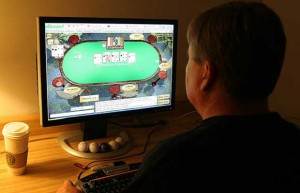
Online Poker Not Creating Addicts, Says Harvard Study

Harvard studies show that most online poker players are restrained in their play. (Image: HelpForInternetAddictions.com)
Click your mouse, lose your house. That’s the mantra that has been repeated for years by anti-online gambling advocates like Sheldon Adelson as they oppose online poker and other Internet casino games. But some new studies are finding that online poker may not be causing any increase in gambling addiction, and that it is actually brick-and-mortar venues that are most likely to encourage betting.
That’s the conclusion reached by a series of studies from the Harvard Medical School’s Division on Addiction, as reported in an extensive article in The Atlantic. Those studies saw researchers partner with European gambling site bwin to find out just how much and how often customers were gambling online, and what the prevalence of addiction might be.
Poker Players Studied Along with Sports Bettors, Casino Gamblers
There were separate studies that looked at online casino gamblers, sports bettors, and poker players. The poker study was actually conducted by the University of Hamburg, both for their own purposes and to supplement the Harvard research.
In that study, over two million online poker identities were tracked over the course of six months. The median player from the group played just 4.88 hours, and the majority of players paid less than one dollar each hour in rake. Essentially, most players were very casual in their poker play, and certainly didn’t exhibit behaviors that seemed in line with compulsive gamblers.
That information was similar to the results found by eCOGRA, the online gambling regulatory group. In 2007, they commissioned a study by Nottingham Trent University to see just what online poker players were doing. Even then, when online poker was perhaps as hot as ever, they found that players were only at the virtual felt for an average of one to two hours at a time. They also saw that the majority of players sat at just one or two tables, and paid an average of $1.20 in rake each hour.
The Harvard studies into other forms of online gambling backed up these findings. In a look at more than 4,000 online casino gamblers, it was found that the median frequency of betting was just once every two weeks. Meanwhile, another study into online sports betting looked at about 40,000 bettors, and found that the median gambler bet just once every four days, making 2.5 bets of about $5.50 each.
Small Number of “Intense” Gamblers Inflate Averages
It is important to note that the studies reported their results in medians, rather than averages. This was done to give a better impression of a truly typical online gambler, as a few percent of players skewed the averages upward significantly. These players that engaged in “intense gambling behavior” made up between one and five percent of the players studied.
This suggests that the vast majority of players are gambling very responsibly when they get online. That may come as a surprise: after all, the instant access of Internet poker rooms would seem to make them more likely to promote rash, spontaneous decision-making. But researchers have previously found that it is the “playground” atmosphere of casinos that tends to encourage more spending, something that online poker rooms can’t truly provide.
Additional exposure to gambling hasn’t seemed to increase problem gambling, either.
“Contrary to predictions from the exposure model, the prevalence of [pathological gambling] has remained stable…during the past 35 years despite an unprecedented increase in opportunities and access to gambling,” Harvard researchers Howard Shaffer and Ryan Martin wrote in 2011.















0 Comments